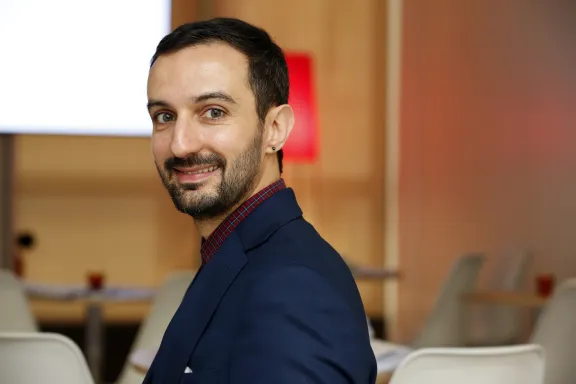Emmanuel Perisse How past experiences shape future decisions
Emmanuel Perisse, post-doctoral research assistant, Scott Waddell Laboratory, Centre for Neural Circuits and Behaviour, University of Oxford (UK)
- 2010 • Bettencourt Prize for Young Researchers
- 2017 • ATIP-Avenir Program

Animals must learn from their experiences in order to survive and thrive in a complex world. Emmanuel Perisse studies the neural networks that allow us to assess experiences and influence future decisions. His research could help people with addictions.
Learning from mistakes
Even fruit flies learn from their mistakes throughout their lives. In their brains, dopaminergic neurons in neural circuits of reward and punishment direct the evaluation processes, which researchers model absolutely as good or bad and relatively from best to worst.
Yet these processes are still poorly understood. Dr. Perisse combines molecular, physiological and behavioral approaches to shed light on these essential tasks. He characterizes the neural circuits involved and studies their function in encoding the absolute and relative value of experiences.
From flies to humans
Drosophila melanogaster, better known as the common fruit fly, is particularly suitable for this work. Dr. Perisse has spent over eight years trying to understand them. Over the years, researchers have supplied the otherwise relatively simple fruit fly with an extremely powerful genetic toolbox. This allows them to precisely target and study the neural networks that underlie behavior. With unprecedented cellular resolution, he identified a small number of dopaminergic reward neurons critical for the relative evaluation of negative experiences.
The ATIP-Avenir grant allows the scientist to go further in his research. He is interested in the role interactions between reward and punishment neural circuits play in encoding the absolute and relative value of experiences. If experience changes the representation of value in the brain, this means that it influences future decisions. A better understanding of this mechanism could have applications in the treatment of certain neurological disorders. For example, addiction and obesity are closely linked to dysfunctional evaluation and decision-making.
Emmanuel Perisse in a few words
Emmanuel Perisse began his career in Toulouse, where he wrote a thesis on the neurobiological basis of learning and memory in honeybees. The researcher wants to use genetics to obtain a higher resolution of the neural circuits involved in memory processes. He joined Scott Waddell’s laboratory in the United States, then in England, where he did research on Drosophila melanogaster, the fruit fly.
During his post-doctoral fellowship, he contributed to a better understanding of the neurons involved in evaluating past experience. The ATIP-Avenir grant allows Dr. Perisse to continue his research and opens the way to managing addictions better.
ATIP-Avenir Program
Since 2005, the Fondation Bettencourt Schueller has been a partner of the Inserm Avenir program. In 2009, the Avenir program merged with the ATIP program by the CNRS (National Center for Scientific Reasearch). The Foundation has since supported the ATIP-Avenir program which promotes the return or settlement in France of very high-level young researchers, with a research project of exceptional quality, and wishing to create their own team.
All the award-winnersBettencourt Prize for Young Researchers
Created in 1990, the Bettencourt Prize for Young Researchers is one of the first initiatives of the Fondation Bettencourt Schueller. Until 2021, this prize was awarded each year to 14 young doctors of science or doctors of medicine, to enable them to carry out their post-doctoral stay in the best foreign laboratories. 349 young researchers were distinguished. The prize endowment was €25,000.
All the award-winners